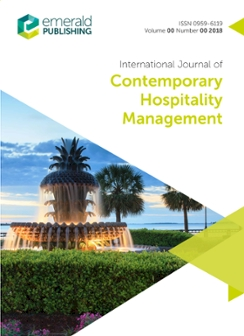Table of contents
The construction of the affinity-seeking strategies of Airbnb homestay hosts
Hanqin Qiu, Dongzhi Chen, Jian-Wu Bi, Jiaying Lyu, Qinghui LiThis study aims to explore the dimensions and sub-factors of Airbnb hosts’ affinity-seeking strategies. It also aims to build a conceptual framework of hosts’ affinity-seeking…
From curious to connoisseur: a longitudinal segmentation of attendees at a Chinese wine festival
Fangfang Shi, Shaojun Ji, David Weaver, Ming-Feng HuangThis study aims to examine the components and evolution of the Chinese wine festival market using the Dalian International Wine and Dine Festival (DIWDF) as a case study.
The synergistic impact between internationalization and supply-and-demand interaction on firm performance: a study of environmental responsibility in social networking service
YooJung Kim, Yejung SeoThis study aims to investigate the relationship between environmental activities and consumer engagement on firm performance according to supply-and-demand perceptions, and…
Beauty premium or beauty penalty in sharing accommodation situations based on lay theories
Yaoqi Li, Lixin Peng, Shuang Ma, Xiaoman ZhouLimited research has paid attention to the physical attractiveness stereotype in peer-to-peer sharing accommodation settings. Since the high-risk situations in sharing…
Critical success factors of green hotel investment in Taiwan
Kuo-Ning Liu, Clark HuThis study aims to address research gaps by constructing critical success factors (CSFs) in the context of green hotel investment in Taiwan. It contributes to the domain knowledge…
Consumer approach intentions amid COVID-19: the role of safety compliance and perceived risk
Amro A. Maher, Tamer H. Elsharnouby, Abdullah M. AljafariThis study aims to investigate how employee and other-consumer safety compliance amid the COVID-19 outbreak influences a focal consumer’s intention to approach a service…
A qualitative study of antecedents of enduring involvement and its role in dining experiences of tourists
Arman Akhoondnejad, Christopher Rosin, Charles BrennanConsidering the importance of involvement in experience, this paper aims to understand what factors lead to enduring involvement and how this type of involvement influences the…
Poverty and tourism decision-making: a chaordic perspective
Anna Farmaki, Nikolaos PappasThe influence of destinations’ poverty on tourism decision-making and, more precisely, destination selection has received scant attention despite the increasing importance of…
How does discrimination occur in hospitality and tourism services, and what shall we do? A critical literature review
Lingxu Zhou, Jingyu Liu, Deguang LiuThis study aims to critically review the research on the phenomenon of discrimination in hospitality and tourism services to identify the key thematic areas, scenarios…
Role of affective forecasting in customers’ hotel service experiences
Mathieu Lajante, Riadh Ladhari, Elodie MassaResearch on the role of affective forecasting in hotel service experiences is in its infancy, and several crucial questions remain unanswered. This study aims to posit that…
Family-supportive supervisor behaviors and employee turnover intention in the foodservice industry: does gender matter?
Phillip M. Jolly, Susan E. Gordon, Timothy T. SelfThe restaurant industry is characterized by long hours, intense job demands and a lack of work-life balance. While a growing body of research has investigated methods for…
Human resource management studies in hospitality and tourism domain: a bibliometric analysis
Elbeyi Pelit, Esra KatirciogluBibliometric analysis allows examining a large volume of bibliometric data within an objective perspective. The purpose of this study is to conduct a bibliometric analysis to…
Does social class matter in recovering self-service technology failures?
Heewon Kim, SooCheong (Shawn) JangThis paper aims to examine the interaction effect among the subjective social class, service level and recovery type on post-failure service evaluations (recovery satisfaction and…
Artificial intelligence: a systematic review of methods and applications in hospitality and tourism
Zohreh Doborjeh, Nigel Hemmington, Maryam Doborjeh, Nikola KasabovSeveral review articles have been published within the Artificial Intelligence (AI) literature that have explored a range of applications within the tourism and hospitality…
Restaurant management and food waste reduction: factors affecting attitudes and intentions in restaurants of Spain
Viachaslau Filimonau, Ayşen Coşkun, Belen Derqui, Jorge MatuteAlthough the challenge of food waste (FW) in the foodservice sector is significant, restaurant managers do not always engage in its reduction. The psychological reasons for this…
Residents’ perceptions of environmental certification, environmental impacts and support for the world expo 2015: the moderating effect of place attachment
Girish Prayag, Mesbahuddin Chowdhury, Daniel Prajogo, Marcello Mariani, Andrea GuizzardiBased on social exchange theory (SET) and signaling theory (ST), this study aims to evaluate how an event’s perceived environmental certification (PEC) by residents, affect their…
Why do hotel interns stay in the hospitality and tourism industry? An interactionist perspective of organizational socialization
Xiaoman Zhou, Yaou Hu, Yaoqi Li, Biyan WenPromoting interns’ organizational socialization has become an urgent concern for the hotel industry. Building on career construction theory, this study aims to use a time-lagged…

ISSN:
0959-6119Online date, start – end:
1989Copyright Holder:
Emerald Publishing LimitedOpen Access:
hybridEditor:
- Prof Fevzi Okumus